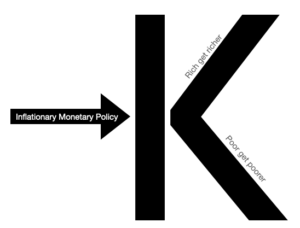VIDEO TRANSCRIPT:
Hey everybody. Jeff Nabers, here it is Thursday, September 19th when I’m recording this, you’ll probably get this in the afternoon, maybe early morning Friday, and this is a kind of potentially momentous time. Okay. The Federal Reserve has just done three bailouts this week for the first time in over 10 years since the global financial crisis in 2008 so what’s going on? Who’s getting bailed out and what does this lead to? That’s what we’re going to talk about in this video. Okay. A couple of news stories. We’ll start with here. I’ll share my screen. You see from the Wall Street Journal, fed injects more money into money markets after banks bid heavily for funds. Then you see fed add $75 billion to the financial system and the third repo transaction. This week here we’ve got an explainer from Reuters. The Fed has a repo problem. What’s that? And then kind of a related story on CNBC fed loses control of its own interest rate as it cuts rates.
This just doesn’t look good. Says the headline. Okay, well, I’ll put links to those stories so you can read them below the video here. So what’s going on here? Well, first off you’re going to see this is all about repo markets and the Federal Reserve is doing repo operations or repo transactions. Okay? What’s happening is the mainstream media is treading lightly. They don’t want to use the B word. They don’t want to alarm anyone, but the truth is we’re going to have to use the B word if we want to talk plainly in ways we can understand. These are bailouts directly quoted from a text message I received this morning from the CEO of a nationally chartered bank here in the United States, $53 billion bail out Monday, $75 billion bailout, Tuesday $75 billion bailout Wednesday. This seems to have no stopping point and quote. What are repo markets now to understand repo markets, what they are and why they exist.
We need to go back to look at banks in a particular fractional reserve banking. The way fractional reserve banking works is if you have some money that you want to deposit, and I’m a bank, let’s say you deposit $100,000 at my bank, I’m going to then lend 90,000 of your dollars out to somebody else and earn interest on that and then I’m going to keep 10,000 of your 100,000 as reserves, but when you log into the online portal or get a statement from me, it’s going to say, I have your $100,000 or your $100,000 is in my bank. That’s not entirely true. I don’t have most of your money. I have a tiny sliver. I have that $10,000 of your money. The rest of money I’ve loaned out to somebody else, but can’t you withdraw that from your checking account? Yes, of course. If you come and say, I would like to withdraw the $100,000 now I have to give it to you, but guess what?
It’s not your hundred thousand dollars because I’ve loaned most of that to somebody else. I’m going to have to give you somebody else’s $100,000 then at night, when I go to balance my books, if I’ve had too many withdrawals and I end up short on the amount that I need to have as a bank, then I’m going to go into these repo markets and I’m going to borrow money from other banks. So tonight I’m going to go borrow money from another bank. You know, maybe tomorrow I’ll have a surplus and they’ll be short and they’ll borrow money from me. Now the first thing most people think when they hear about fractional reserve banking is they’ll say, isn’t that a Ponzi scheme? The answer is technically yes, it’s a Ponzi scheme. But the reason it doesn’t collapse, you know, five minutes after a bank opens is because of the repo market.
The repo market is a way to sort of try to shore up the banking system. And the banking system works by essentially kind of socializing among the banking industry, the shortages, those are shored up by another bank. And that’s a bit about how repo markets work and why they exist. They exist so that banks don’t collapse really frequently and during normal operations. Next question you might be wondering is, well, why did the Federal Reserve have to bail out the repo markets? Well, the Federal Reserve injected now over $200 billion this week into repo markets because the banks didn’t want to lend to each other. That happened because of the banks don’t trust each other. And that means the banks think that they might not be able to pay each other back. So this could mean that there’s one bank that a lot of the other that needs money that the other banks don’t think will pay them back.
Or it could be multiple banks, it could be small banks, it could be big banks, it could be multiple banks. We just don’t know. Maybe some books, we’ll cover it in the future. If this ends up having a domino effect into a big crisis. All we know right now is that the repo market lint froze up the Federal Reserve, bailed them out. And all we can do is wonder, why don’t these banks trust each other? And or why can’t these banks, why is there not enough money in these banks to shore up their own shortages for the last few evenings? So what’s going to happen next? Well, this doesn’t appear to be necessarily contained just yet. You know, we had no overt fed bailouts for over a decade and now we had one Monday, Tuesday, Wednesday. So there could be one tomorrow or the next day. There could be some things happening over the and this could be the beginning stages of a recession or potentially even a financial crisis.
So I’ll continue to report on this as new information comes out. If you like this video and if you like staying in touch with real financial news, then click the like button and the subscribe button and hit that notification bell to stay in the loop with the videos that we put out. Also, tell me what you think in the comments below. What are your thoughts on this bailout? Do you think they’re keeping everything under control? Do you think this is cause for alarm? And what are you doing as an investor? Are you prepared for recession? Do you think that we’re not going to have a recession? Again? Tell me what you think in the comments below. I’d love to hear it in particular. I’d love to hear what you are doing to prepare for cycles and recessions and potential crises. What are you investing in? How are you investing and how does this play into that? Look forward to reading your comments below, and also I’ll put some links below in the description for some of the things that we have going on and helping people prepare for recession and or potential crisis. That’s it for today. Hope you have a great day.


